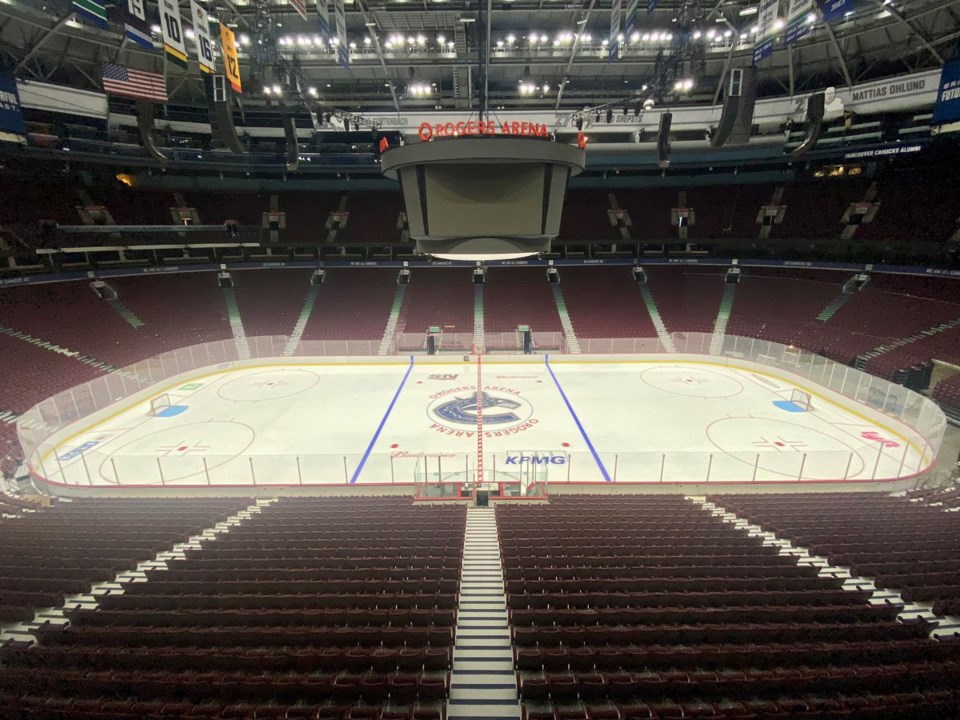Dreams of an all-Canadian division in the NHL next season might be going up in smoke.
The NHL is intent on pushing ahead with the 2020-21 NHL season in the midst of the ongoing COVID-19 pandemic, but the league may be running into trouble with provincial health authorities across Canada.
For a time, it seemed the primary obstruction for playing the season in Canada was the closed U.S.-Canada border that would prevent American teams from travelling to Canada to play. The NHL’s proposed solution to the problem was an all-Canadian division, with all teams only playing in-division during the regular season. That solves the problem of the border, but there are other issues within Canada.
According to a report by Sportsnet’s Chris Johnston, the NHL has a plan B if they can’t sort out those issues: moving all seven Canadian teams to the U.S.
The report came just hours after the Canucks Twitter account tweeted about Rogers Arena being ready to go for training camp and the coming season.
Primed and ready for action. 👀 pic.twitter.com/HvNtxUxt4c
— Vancouver #Canucks (@Canucks) December 17, 2020
The plan for an all-Canadian division doesn’t just depend on approval from the federal government, but from five separate provincial health authorities: B.C., Alberta, Manitoba, Ontario, and Quebec. Each of those provincial health authorities has different restrictions in place that complicate the NHL’s plans.
For instance, Manitoba currently requires 14 days of self-isolation for any travellers entering the province from east of Terrace Bay, Ontario. That restriction would make it nigh-impossible for the Ottawa Senators, Toronto Maple Leafs, and Montreal Canadiens to play road games in Winnipeg.
The restriction also applies to residents of Western Canada that head east of Terrace Bay within 14 days of entering Manitoba, so it would affect the Canucks, Calgary Flames, and Edmonton Oilers as well if they went on a road trip. The added complexity that would add to scheduling the season is staggering.
All five provinces currently have restrictions in place on public gatherings, which could affect games being played. With each team dressing a roster of 20 players per game, four on-ice officials, even more off-ice officials, plus coaching and training staffs, every NHL game easily exceeds even the looser restrictions on gatherings of up to 50 people that were previously in place in many provinces, let alone the tighter restrictions in more recent months.
The challenge for the NHL is coming up with safety plans robust enough to pass the muster of all five provinces, allowing them to bypass those restrictions.
The Public Health Agency of Canada is currently coordinating discussions between the NHL and provincial health authorities. Though the agency does not have the authority to make decisions for the provinces, spokesman André Gagnon released the following statement:
“The Government of Canada’s priority is to protect the health and safety of Canadians. The resumption of sports events in Canada must be undertaken in adherence to Canada’s measures to mitigate the importation and spread of COVID-19. NHL teams and other professional sports teams must operate within the rules of their provincial jurisdictions for sports and sporting events.”
There are certainly cities in the U.S. that would be interested in hosting NHL games. Ottawa Senators reporter Bruce Garrioch suggested that Kansas City, Milwaukee, Austin, and Orlando could push to host Canadian teams. Kansas City, in particular, frequently comes up in NHL expansion talks.
The Canucks, for what it’s worth, have connections to a couple of those cities. The Kansas City Blades were the Canucks’ IHL affiliate during their final season in 2000-01, when they were coached by Stan Smyl.
Likewise, the Milwaukee Admirals were the Canucks’ IHL affiliate from 1988-1993, with prospects like Gino Odjick, Garry Valk, and Troy Gamble spending time in Milwaukee on their way to Vancouver.
The backup plan for Canadian teams to play in the U.S. likely won’t be a popular one for the players, who will be forced to leave behind families in Canada for months at a time. Relocating entire families south of the border could cause further complications, so the priority for the NHL will be their continued negotiations with provincial health authorities.
At the same time, the idea might find some support among Canadian owners, many of whom are facing the prospect of playing an entire season without fans in their arena. Relocating to U.S. cities where they may be able to have fans attend games could be a tempting prospect. It’s not without its own issues, however.
The NHL isn’t just running into issues in Canada, as some areas of the U.S. also have tight restrictions that could prevent games from being played. The San Jose Sharks, for example, are planning to hold their training camp in Scottsdale, Arizona instead of their home rink because of Santa Clara County’s restrictions.
While attempting to play the season in quarantined bubbles as they did during the 2020 Stanley Cup Playoffs won’t be possible, the NHL is exploring the possibility of hub cities that host a number of teams, playing a sort of mini-tournament between all the teams before moving on to another hub.
It’s a format that could also see play in Canada if the NHL can come to an agreement with some provincial health authorities, but not others.

.JPG;w=120;h=80;mode=crop)


